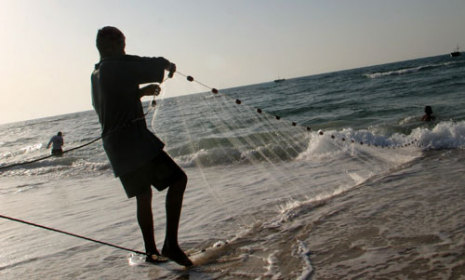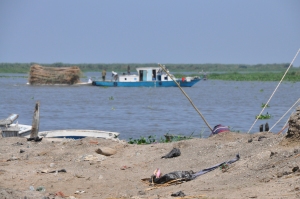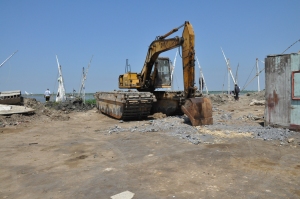An increase in illegal fishing is threatening the nation’s underwater treasures By Lamia Hassan
(Egypt Today Magazine, November 2010)
Renting a fishing boat in Sharm El-Sheikh is an easy task. Numerous boats wait every day at the marina and can be hired out on demand. The types of boats vary, but there’s one thing they all have in common: a sign saying fishing near coral reefs is prohibited.
Like hiring a boat, ignoring that sign is all too easy these days. Port authorities ask few questions about fishing equipment or do little warn off fisherman from areas where fishing is banned.
“From the moment you leave the port and until you come back, no one supervises where you go fishing and what kind
of tools you are using to catch the fish or what kind of fish you brought back with you,” says fisherman Mohamed Ahmed Said, better known to his clients as Abu Ahmed. His boat, Karam Allah, plies the Red Sea waters near Hamata, a reef-rich area about 100 kilometers south of Marsa Alam. Every day, Abu Ahmed says, he is a witness to the growing numbers of people participating in illegal fishing.
It’s not an issue limited to Sharm El-Sheikh or Hamata. Since 2008, many of the nation’s waters and aquatic treasures have been increasingly threatened by illegal fishing. Though laws exist to prevent the practice, they are not enforced, say locals.
They say illegal fishing is not only destroying Egypt’s natural resources, it is also threatening the diving and tourism industries, each worth billions of Egyptian pounds.
Unprotected Areas
While the problem of illegal fishing is nothing new, those in the industry say it has become a more acute problem closer to shore and in prohibited or protected areas.
According to Ministry of Agriculture Decree no. 124, for year 1983, regarding fishing, aquaculture and regulation of fish farm, it is forbidden to fish in areas where fishing is prohibited or by using illegal equipment, or during any time that the Ministry of Agriculture prohibits fishing. Fishing boats are not allowed to have illegal equipment, such as mesh nets or spearguns, on board. The law also sets minimum size and weight limits for fish, making it illegal to buy or possess fish under the legal limits. In addition, it is illegal to remove ornamental fish from the sea except permission from the General Authority for Fish Resources.
“I go out to sea almost every day and I see how the fishermen are damaging all the resources in the areas where I work, like Hamata,” says Abu Ahmed, “leaving the fish with no chance to reproduce and continue living in the Red Sea.”
Illegal equipment such as nets with tightknit weaves are increasingly used by fishermen hoping to cash in on bigger catches – without regard for the damage the nets cause to sea life at large.
“How could we leave boats to damage an area like Hamata, where there are a variety of activities like fishing, snorkeling and even diving that generates income to all the people working in this field?” Abu Ahmed says.
A mainstay of the tourism sector, Egypt’s diving industry is worth about LE 15 billion yearly.
Hisham Gabr, chairman of the Chamber of Diving and Water Sports, says he receives complaints from fishermen reporting illegal fishing in several protectorates. Gabr says that some boats have managed to fish in Ras Mohamed and the Gulf of Al-Aqaba protectorates, damaging coral and further decimating marine life there.
“We are facing so many challenges here in the Red Sea, the major one would be that our main natural resources are being destroyed,” says Gabr. “Every day, from sunrise to sunset, there are boats fishing in Ras Mohamed and destroying the park, and we cannot stop them.”
While recreational fishing boats use fishing poles for individual catches, commercial fishermen often trawl an area, dragging large, tightly woven nets behind their boats.
“Since the holes are really tight, they not only catch some types of fish when they are smaller in size, but they also catch the baby fish that you cannot even eat and therefore damage the reproduction cycle,” says Alaa El-Haweet, a professor at Alexandria’s National Institute of Oceanography and Fisheries (NIOF ). “For example, at the fish market, the bolti (tilapia) fish caught by fishermen were sold at the size of 25 centimeters, but now with fishermen just catchingthem at any size, you would find the bolti now in the market are around 20 or even 15centimeters only.”
Authorities have tried to address the issue, but with little success. In 2008, a conference in Sharm El-Sheikh brought together the governors of the Red Sea, South Sinai and Suez as well as various ministry officials and experts in search of an immediate solution.
Their effort had little effect, Gabr says. “We even tried to repeat the same initiative another time in March 2009 but this time in Hurghada, and the same thing happened but nothing really changed.”
Though a legal framework has been in place to prevent illegal fishing since 1983, the real problem is a lack of oversight and enforcement.
When it comes to illegal fishing in protectorates, Gabr says it is the duty of the Ministry of State for Environmental Affairs to supervise these areas. But he alleges people are still able to obtain permission to fish in protected areas because of corruption in the system. Egypt Today contacted the Ministry of State for Environmental Affairs, but officials were unavailable for comment.
There is also a lack of awareness as to why these types of fishing are illegal, says El-Haweet. Many fishermen do not recognize the immense importance of natural resources to the area, let alone their future livelihoods.
Gabr agrees. “People do not understand that the economic value of the presence of these fish in the sea is billions of Egyptian pounds coming from this type of tourism; these billions will continue to be added to the Egyptian economy as long as the fish are there in the sea and reproducing.”
Finding a Solution
At this juncture, experts say it is difficult to determine how long fish populations will be able to survive, with illegal fishing practices destroying their numbers and disrupting the reproductive cycle.
NIOF ’s El-Haweet says that if laws are enforced and coupled with increased supervision and awareness sessions for fishermen, the problem could be controlled.
The government currently prohibits fishing for two months of the year to give fish a chance to repopulate. Abu Ahmed says it isn’t enough. “The fishermen still need money, and even if the government prohibits fishing for two months, they still manage to catch fish,” he says. “They are only compensated LE 90 for each day during the two months, which is really nothing.”
Despite the setbacks, people like Gabr haven’t lost hope. “During the last economic forum that took place in Sharm El-Sheikh, our prime minister announced that Sharm El-Sheikh will be the first green city in Egypt,” Gabr says. “Even as we speak, there are preparations to form a committee for it to be on top of the situation in Sharm, but it is still in the process.” et
————————————————————————————————————————————
Wanted: Friends of the Fish
Have you seen fishing boats in marine protectorates such as Ras Mohamed National Park? The Chamber of Diving and Water Sports (CDWS) wants to know. Make a note of the boat name and registration number, and if possible, document its activity with photos or video. Email the CDWS at fishing@cdws.travel with the date, time, name and registration number of the boat, location and any other useful information such as photos or video of the boat’s activities.



